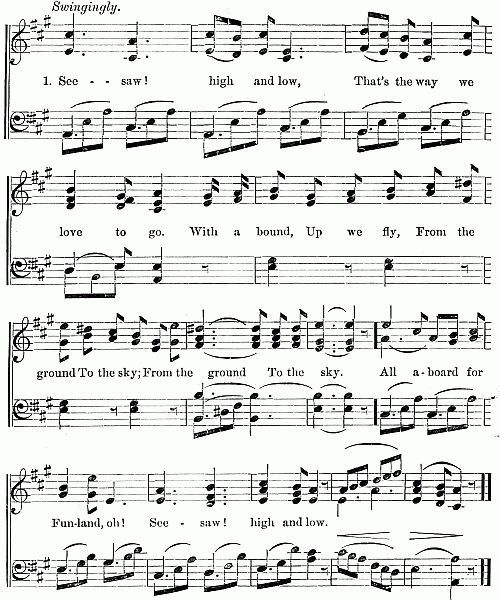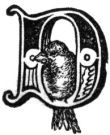
O grandpa's cows chew gum, like Mr. Connor's cows, mamma?" asked Johnny, a few days ago, as he stood emptying his pockets of hay-seed on the dining-room carpet, after a visit to the barn.
"Cuds you mean, don't you, dear?" asked mamma.
"No, gum. Mr. Connor says it's gum; and they're his cows: so he knows."
"No, grandpa's cows chew cuds, like all good grass-eating cows. Perhaps Mr. Connor's cows do not eat grass or hay."
"Yes, they do," said Johnny. "I've seen 'em."
"Well, then," said mamma, "they must chew cuds."
"What are cuds, mamma?"
"Why, after the cow has chewed the fresh green grass or the dry hay in her mouth, she sends it down into a large stomach, to be soaked; then she sends it into another stomach, to be rolled into balls; then up it goes into her mouth again, to be chewed over; and each little ball is a cud."
"Doesn't she have any other stomach for it to go into then, mamma?"
"Yes, two more. Do you have four stomachs, like a cow?"
"No, of course I don't. I don't chew cuds."
"Well, you may get a brush and dust-pan, and brush up that hay-seed from the carpet; then come with me, and I'll show you a picture of a giant kangaroo with her baby in a fur bag."
"Oh! where does she live, mamma?"
"Brush up that hay-seed, then I'll tell you all about her," said mamma. With this promise in view, Johnny hastened to brush up the litter he had made, talking to himself the while, somewhat after this wise,—
"Chew away, old cow! You'll have to keep your big teeth going all night to keep all those stomachs at work. One stomach, two stomachs, three-e-e, four-r-r. All ready, mamma!"

A CAT STORY.

ID you ever see a cat laugh? Look at the cat in the picture, and see if she is not laughing. It is plain to me that she is.
What is she laughing at? Why, that is plain enough too. She is amused at the talk of those two little girls about her kittens.
There are four kittens,—just two for each; but little Jenny wants to take them all up in her arms, though she can hardly hold more than one. This is what pleases the old cat.
Now I am going to tell you a cat story.
Once, when I taught school in the country, I boarded at farmer Clark's house, where there were sixteen cats,—Yes, sixteen cats! There was a big yellow cat, and a big gray cat, and a big black-and-white cat, and lots of little kittens.
The big gray cat was named Gussy. She was the grandmother of them all. She lived in the house. The rest staid around the barn. Farmer Clark was a good man, and did not believe in killing any thing that was not dangerous to life or property. So no little kittens were drowned, if he knew it.
Mrs. Clark taught me how to make butter; and I was told to feed the skimmed milk to the cats. There were two large dish-pans that I used for this purpose. They were shallow and leaky; but precious little time there was for the milk to leak.
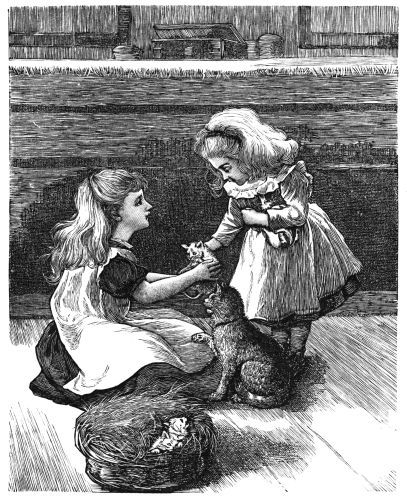
As soon as I appeared at the door, and called, "Tom, Tom!" the cats came tumbling, pell-mell, mewing, and rubbing against me. It was a sight to see.
First, there would be a thick row of cats around the pans,—so thick that only sixteen tails and thirty-two hind-legs could be seen. The next minute the heads would go lower, and the fore-paws would go up on the edge of the pans.
Then a kitten would jump in. Then they would all fight, and push, and spit, and snarl to get to the lower side of the pan, where the milk was the deepest.
And then it was all gone. And the pans would be licked clean. And then sixteen tongues licked sixteen jaws, and thirty-two eyes appealed for more. But it was no use to beg. Then sixty-four legs trotted off, and only old Gussy went into the house; while the others went to the barn.
There were no rats or mice around those premises, I tell you. I often wonder how many cats there are at farmer Clark's now. And sometimes I dream about them. This is a true story.

TOM'S APPLE.
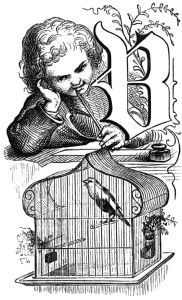
AH! ugh! oh!" cried little Tom. "There's a worm in my red apple, mamma."
"Is he a pretty worm?" asked his mamma, looking up from her sewing.
"Pretty, mamma! Who ever heard of a worm being pretty? No, no! he's a horrid crawling thing. I sha'n't eat any more of the apple. I couldn't, now I've seen him in it."
"Let me see him," said mamma: so Tommy brought the apple to his mother.
"Why, yes, he's a beauty," said she. "Just look at that little red cap he wears, and see how soft and white his skin is. If nobody had picked that apple, he would have spun a little rope from out his body, and let himself down from the high tree, down, down, to the earth.
"Then he would have crawled into a little hole in the ground. When he had covered himself all over with a gray sheet, he would sleep, sleep, sleep. But by and by he would awaken.
"He would come out of the tight shroud, and find that he had airy, gauzy wings with which he could fly: so he would go flitting and fluttering up into the warm sunshine to find an apple-blossom."
"What would he want of an apple-blossom?" asked Tommy, much interested now in his apple-worm.
"Oh, to lay an egg in," said mamma. "And, when the apple-blossoms grew, the egg would be softly wrapped within its pink heart. And when the blossom turned into an apple there would be a tiny baby-worm to feed upon the white pulp. Then some day, perhaps, some other little boy would exclaim, 'Bah! ugh! oh!' about him, as my little boy did just now about the mamma-worm."
"Oh!" said Tom thoughtfully. "I'm glad nobody will have that chance: here goes."
And he tossed the apple, worm and all, out of the window.
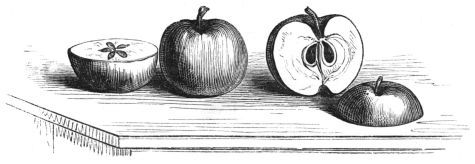

SEE-SAW.
and a larger image of the music sheet may be seen by clicking on the image.]
That's the way we love to go.
With a bound,
Up we fly,
From the ground
To the sky;
From the ground
To the sky.
All aboard for Fun-land, oh!
See-saw! high and low.
2. See-saw! birdies play
On the tree-tops, just this way;
And the bees
Rock the rose,
When they please
With their toes!
And the winds the wavelets blow,
See-saw! high and low.
3. See-saw! oh, what sport!
Wish the days were not so short!
Girls and boys,
Everywhere,
Rosy joys,
Earth so fair!
Gayer playmates do you know?
See-saw! high and low.

Transcriber's Notes
Obvious punctuation errors repaired.
The original text for the July issue had a table of contents that spanned six issues. This was divided amongst those issues.
Additionally, only the July issue had a title page. This page was copied for the remaining five issues. Each issue had the number added on the title page after the Volume number.
